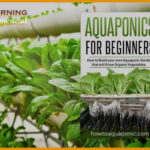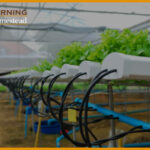Last Updated on March 8, 2024 by Georgie Smith
Home gardening is increasingly becoming popular among urban dwellers, but, this does not mean everyone does it the right way. It too comes with its challenges; some are unique and others, somewhat common. Sometimes it depends on the specific nature of farming you want to partake in and the activities that are involved.
The type of farm equipment one needs and whether it is labor-intensive are issues you will need to consider before getting started. For a slightly relatively peculiar farming method like hydroponics, the concerns are always massive.
Basic Comparison:
SSL
Storage
Domains
Sub-domains
Hydroponics Guide
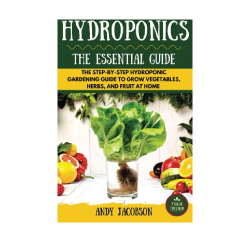
Plant Nutrition
Lighting
Growing Process
Hydroponic Systems
Ultimate Step-by-Step

Language:English
File size:1474 KB
Supported
111 pages
Definitive Beginner’s

Language:English
76 pages
4.2 ounces
9.02 inches
For the layman working with hydroponics, modern technology can be somewhat confusing. In this article, we will be discussing the best hydroponic books for beginners. However, before we get to that, enjoy reading a little about the industry, and all its fascinating details.
Where to Start
Once you are ready to get started keep in mind, there are times when things fall apart midway despite beginning with a great start. Therefore, with all the changes that take place, it goes without saying that one needs to be well-familiar with what he or she should do and what to avoid.
That includes farmers who are practicing small scale as well commercially-oriented hydroponics. I will look at types of crops popular with this type of farming a bit later. Agriculture systems involved in hydroponics is another crucial factor, and arguably, most aspects are basically the same everywhere.
There is no such thing as having too much knowledge and skills, especially when at the end of the day, everyone expects a plentiful harvest. You need to, therefore, strive to overcome all the challenges that are always glaring at your continued efforts.
One day, everything is okay, and another time, things start to fall apart. The latter scenario usually brings to mind many questions. For instance;
- Do you understand what hydroponics is all about?
- Do you really have adequate skills?
I bet no one wants to venture into hydroponics with the aim of failing. If for no other reason, it should be an exciting farming method, to say the least. That depends on the type of crops you want to grow.
What’s more is that you would not want to spend vast sums of money setting up the best hydroponic systems and invest your effort in it only for everything to go to waste. With these taken into account, more questions arise.
Do you need an expert in hydroponics to guide you through the basics starting as an apprentice or is it something you can start right away by reading relevant books?
The issue of hydroponics books is a somewhat common question among newbies and which this post will explore in great detail.
Hydroponics: How it Works
When it comes to farming, people hold different opinions when it comes to an understanding of how hydroponics works. However, what is always pretty clear is that you would not require soil to get started whichever way you look at it.
From the name itself, water is hugely present or instead makes up the most significant percentage of a culture solution where you will grow plants. The whole idea of this type of farming is to do away with soil at whatever cost fundamentally.
…But here is the catch; what happens after that…?
Now, because the soil is not in the equation, you will not just submerge your plants entirely in the water and expect a miracle. The magic wand here is getting to know the right ingredients and how to mix them together with water for the best crop yield. Plants need nutrients, apart from water and oxygen.
Essential air components exist in water, and plants can extract that on their own. That is why; ‘hydro’ makes a hugely critical element in hydroponics. Earlier, I stated about the growing system. That is what replaces soil by functioning as a reservoir that supports your growing efforts.
Also, take note that systems vary, and usually, choosing an ideal one depends on how it can efficiently reduce wastage of the nutrient solution and whether it requires a little more effort in managing and setting everything up.
Other factors people who have an interest in hydroponics should consider is the cost of constructing an adequate system and the scale of farming. The latter issue is more pronounced by the size of hydroponics air pumps.
A perfect blend of any hydroponic system, whether Ebb-flow, deep water culture, a wick system, drip method, or Aeroponics, and the best nutrient solution is always a recipe for phenomenal success. Do not forget that you need to establish it in a relatively lit environment because crops need sunshine for photosynthesis.
That should, however, be regulated to control the growth of algae. For starters, the wick system is thought to be ideal because it is easy to set up and practice. Another critical component that contributes to the functionality of a hydroponic system is an air stone. Air stones help control the depth of root reach into the solution.
That is important because when your crops are submerged more than is necessary, the stems will begin to rot. Air stone also helps generate bubbles around the root zone thus making it easier for plants to extract as much oxygen, hydrogen, and any other useful gas as possible.
One that generates smaller bubbles is always better because it equals slow but maximum absorption of air. Oxygen is a big necessity for plant respiration, and when there are enough water and nutrients, you can always expect a lush and greater fodder count.
Why is Hydroponics Better Than Soil?
Anyone who is interested in practicing hydroponics first wants to know why it is better than soil. There are many reasons to justify this and make no mistakes; the reasons are significate. Think about the joy of waking up each new day to watch your plants grow.
It is not just exciting it is a sight to behold as well. Hydroponics is better than soil in the following ways:
- It saves you acres of space. Conventionally, soil plants spread their roots deep and wide in search of nutrients. In hydroponics, this is not the case. A perfect blend of cultural solution and essential ingredients make access to the same easier because there are no barriers around roots.
- You will use plenty of water practicing this farming method. In soil, large volumes go to waste through seeping or evaporation. That means plants have all the water available in the soil. In hydroponics, water undergoes what is referred to as recirculation in a holding reservoir. It is an economical way of using water.
- There is no need to worry about pests and water/soil-borne diseases when it comes to growing plants in a culture solution.
- Then there is the issue of weeds that usually compete with plants’ roots in the soil for nutrients and water or oxygen. Weeds are unheard of in hydroponics.
- Another reason why you should choose hydroponics is that you employ less effort in managing your garden. It is basically about ensuring the culture solution is optimally rich in nutrients and that a system for growing is in a good state.
- Further, this farming method gives you more control. You are the grower, the scientist who monitors conditions that favor the growth of plants in the solution, balances P.H., and changes whatever is necessary. These are things you can do any day and time.
- Finally, when you grow plants hydroponically, their maturity is faster, and this is thanks to perfect conditions as opposed to a soil environment when a lot more effort, time, and recourses are necessary and sometimes hard to realize.
What Plants Can You Grow Hydroponically?
If you live next to anyone who practices hydroponics, the better, and it is because you can always catch a glimpse, first-hand as regards what plants thrive well in this farming method. On the flip side, if you are thinking of getting started and accessing a garden where it takes place is near impossible, then this post makes it simpler.
Below are some hydroponics-friendly plants:
- Spinach
- Cherry tomatoes
- Lettuce
- Cucumbers
- Peppers
- Kales
- Watercress
Top-Rated EBooks:
Here we reach the purpose of this article. Books, books, and more books! Going back to an issue regarding the best way to learn hydroponics, it is noteworthy that not everyone has the chance of becoming an apprentice on a gardening farm.
It, however, doesn’t mean all hope of a successful crop is beyond recovery. Those who practice hydroponics usually have a story to tell. From bad experiences to tremendous success, each person’s story is essential and is what will make you an outstanding farmer.
However, finding that perfect book to teach the proper ropes is never easy. It may just be wishful thinking, and this is because, in as much as there are top-rated hydroponics books for every aspiring grower, there are some that teach poor instructions causing you to lose hope.
The following are reviews of the best books available that you will want to invest in for your library and for help establishing your crops.
Hydroponics: The Essential Hydroponics Guide: step-by-step Hydroponic Gardening Guide to Grow Fruit, Vegetables, and Herbs at Home
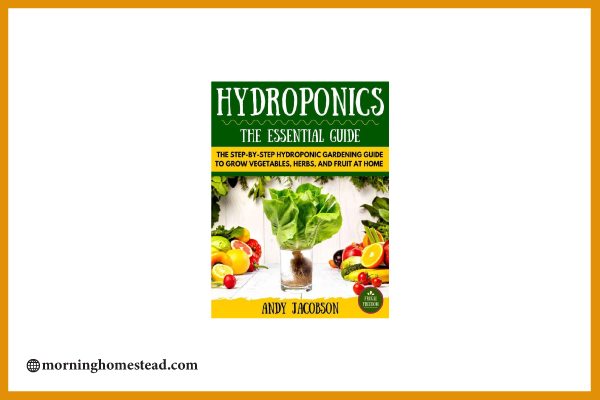
As one of the benefits of hydroponics, you would want to spend less and reap big from your hobby at the end of the day. This book by Andy Jacobson, which you can buy from Amazon, puts everything in practical terms for you.
It constitutes only 136 pages, making it a quick starter guide and a worthy read for anyone who wants to get started on the go. It equips with both theoretical and practical knowledge on how to get started with building and operating a great system.
Also, you get to learn the different types of herbs you can grow hydroponically. Areas covered by Andy Jacobson in this book include an introduction to growing plants without soil, different types of systems, lighting tips, nutrition for plants, medium for growing, and many more exciting things worth learning.
Hydroponics: A Comprehensive Guide to Hydroponics (DIY Hydroponics Gardening, Aquaponics, Homesteading)
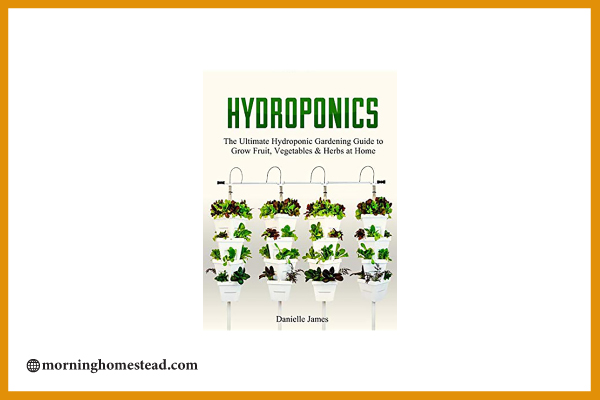
A basic guide is what every starter needs, and if your dreams rest in the hope of becoming a successful hydroponic plants grower, then this book by Celine Walker will give you a starting edge. At the onset of your reading, you get to learn
- What this method of farming is all about
- Progress through different systems
- Elements of Practicing Hydroponics
- How to grow plants
- All about nutrients and water
- How to solve growing system failures.
This book will, therefore, provide you with the perfect answers at every twist and turn. The edition is the volume of one of many series by the author.
Hydroponics: The Definitive Beginner’s Guide to Quickly Start Growing Vegetables, Fruits, & Herbs for Self-Sufficiency!
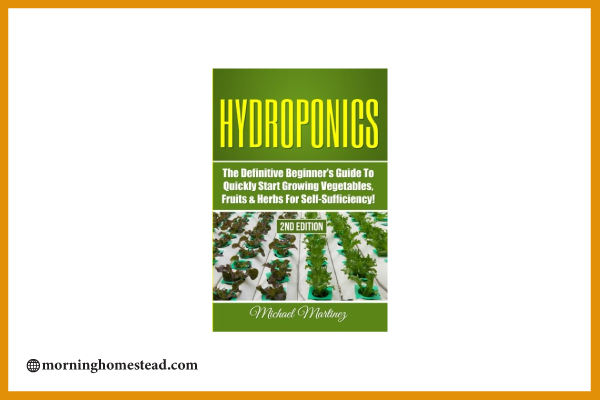
If you ever wondered what self-sufficiency regarding food production is all about? If your answer was yes; then this book is set to unravel the mystery. Michael Martinez takes an insightful look at farming without soil in the most captivating way.
The book discourages the tendency of going to the supermarket to buy veggies every time you need fresh farm produce, thus advocating for hydroponics as a way of growing the same at home. In the most captivating and practical way, it walks you through the
- Variations between soil gardening and hydroponics
- The type of growing systems in hydroponics
- How to keep your plants in excellent health
- How to take care of your hydroponic garden
Hydroponics: The Ultimate Step-by-Step Guide to Effective Home Gardening
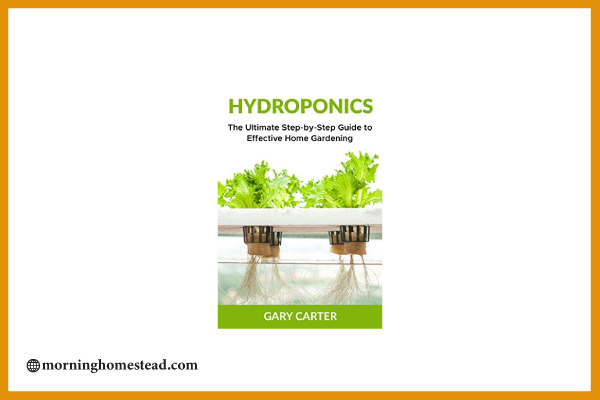
Every good book on hydroponics never disappoints, and this one by Gary Carter is no exception. The conventional way of planting veggies where the soil is primarily involved is slowly fading away, and as people turn to use culture solutions, it would interest you to know exactly what goes into doing so successfully.
In this publication, the author starts with a clear introduction to hydroponics, and with this, you are let into a world of growing systems, especially about how to construct one at home. There is also a chapter that takes you through detailed garden planning, maintenance, and mistakes to avoid.
Other areas covered in the guidebook are troubleshooting hydroponic farming issues and how to solve them, not to mention the best plants ideal for farming.
Hydroponics: A Simple Guide to Building Your Own Hydroponics Growing System

Most people who practice hydroponics face challenges such as constructing their own gardens and one of the main reasons is that there is no useful guide on the topic. Jim Gears guidebook is all you need to understand the basics and start consuming organic vegetables grown on your own farm and by you.
Now, think about becoming that successful hydroponics expert everyone would want to emulate! It starts right here. From a comprehensive guideline on how to build a system of choice, what you need to do to make the most out of this farming method, the benefits of every system, and nutrition for plants to lighting, it outlines techniques that will help you get started in the simplest way possible.
Moreover, if you are already on the go, it is still a necessity because it will move you from a novice hydroponics plant grower to a superstar.
Hydroponics: Hydroponics Gardening For Beginners-A Simple User Guide to Grow Hydroponics Herbs and Vegetables At Home
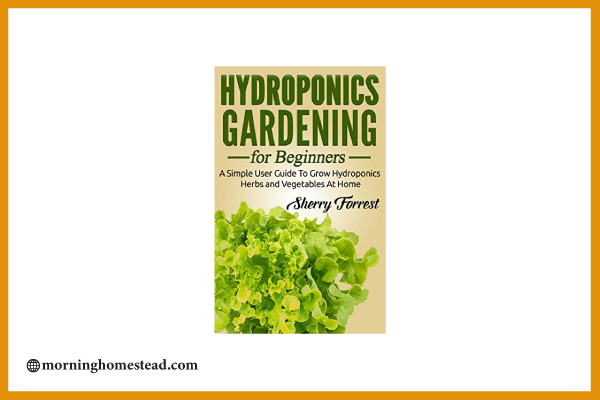
Starters in hydroponics always have to battle with a range of challenges. Moreover, whether you can salvage your plants from dying off or not depends on what guidebook you read. Sherry Forrest did craft the best copy for beginners.
She starts by taking readers through the basic definition of hydroponics and why it is a method that will help you grow and harvest half faster than using soil. There are many things you will learn when you get a copy of this guidebook, and they include:
- Different types of growing media
- Types of hydroponic system
- How to start and tips from experts
- Everything you need to get started
- Guidelines on how to start growing your veggies and herbs with a hundred percent chance of success
- More tips and essential aspects growers need to learn
Hydroponics: Simplified Guide for Growing Vegetables, Fruits, and Herbs at Home for Beginners

The author of this excellent hydroponics guidebook, James Redmon, delves into critical issues every starter and even experienced grower needs to know. There is no limitation to learning which is a necessity with organic gardening for self-sufficiency in food production.
What makes this book even more outstanding is its outlook regarding how to unleash the potential of hydroponics and establish a system that produces the best fruits, herbs, vegetables, and fruits right in your home.
In general, the joy that comes with growing plants hydroponically shines in this book and its very foundation anchors on tips that will move you from a beginner to an expert.
What are the advantages and disadvantages of hydroponics?
Having looked at the different guidebooks on hydroponics, the next question many are usually poised to ask is; are there advantages of this farming method, and what about the downsides? Let me break this down into two parts.
Advantages of hydroponics
The answers to this are almost obvious but here is a quick run-through:
- It is time-saving. No more laboring in the farm killing weeds or watering plants
- With this method of farming, plants mature faster
- Sufficient supply of essential plant nutrients is always a guarantee when it comes to hydroponics because everything the roots need to absorb is in the culture solution
- There is almost zero chance that your plants will be affected by pests. That means no need for pesticides or herbicides unless the culture solution is invaded by water born diseases.
- Close monitoring of plants as opposed to growing in soil
- Less effort in farming
Disadvantages of hydroponics
- Experience goes a long way in delivering the best results regarding farm produce. As a beginner, sometimes you will learn the harder way if there is no one around to guide you or if you fail to read the best hydroponics books
- It can be expensive to set up. That is most of the times pronounced in larger systems where you want to grow vegetables for commercial purposes
- Balancing P.H of a culture solution is somewhat technical if you lack experience. That can be your greatest undoing when high or low acidity levels start having direct impact on the health of plants
Conclusion
In summary, it is always great news when you discover that you can actually grow plants without soil whatsoever. However, while starting right away especially about reduced costs usually manifested in soil farming where you have to buy fertilizers and spray crops with pesticides occasionally, a good start should be premised on having the right knowledge.
Those who practice this method of farming care enough to share their experiences and great tips through books and other forms of publication. The best books ever written on the subject of hydroponics should never be far from thought when it comes to this.
This post saves you the hassle of finding one and the likelihood of landing shallow copies on the web by putting together a compelling review of the best hydroponics books.


